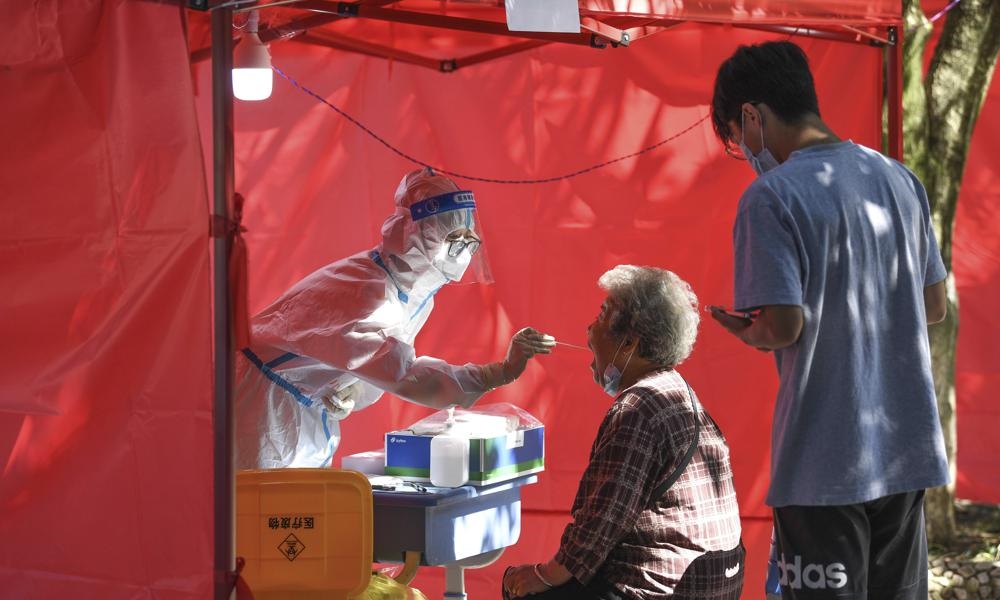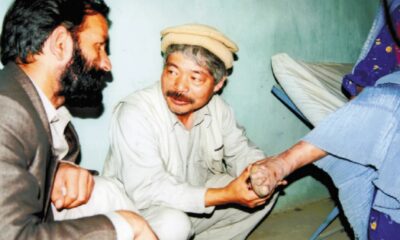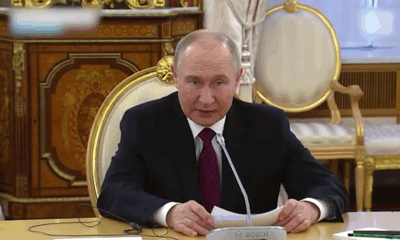COVID-19
WHO: COVID end ‘in sight,’ deaths at lowest since March 2020

The head of the World Health Organization said Wednesday that the number of coronavirus deaths worldwide last week was the lowest reported in the pandemic since March 2020, marking what could be a turning point in the years-long global outbreak.
At a press briefing in Geneva, WHO Director-General Tedros Adhanom Ghebreyesus said the world has never been in a better position to stop COVID-19.
“We are not there yet, but the end is in sight,” he said, comparing the effort to that made by a marathon runner nearing the finish line. “Now is the worst time to stop running,” he said. “Now is the time to run harder and make sure we cross the line and reap all the rewards of our hard work.”
In its weekly report on the pandemic, the U.N. health agency said deaths fell by 22% in the past week, at just over 11,000 reported worldwide. There were 3.1 million new cases, a drop of 28%, continuing a weeks-long decline in the disease in every part of the world, AP reported.
Still, the WHO warned that relaxed COVID testing and surveillance in many countries means that many cases are going unnoticed. The agency issued a set of policy briefs for governments to strengthen their efforts against the coronavirus ahead of the expected winter surge of COVID-19, warning that new variants could yet undo the progress made to date.
“If we don’t take this opportunity now, we run the risk of more variants, more deaths, more disruption, and more uncertainty,” Tedros said.
The WHO reported that the omicron subvariant BA.5 continues to dominate globally and comprised nearly 90% of virus samples shared with the world’s biggest public database. In recent weeks, regulatory authorities in Europe, the U.S. and elsewhere have cleared tweaked vaccines that target both the original coronavirus and later variants including BA.5.
Maria Van Kerkhove, the WHO’s technical lead on COVID-19, said the organization expected future waves of the disease, but was hopeful those would not cause many deaths.
Meanwhile in China, residents of a city in the country’s far western Xinjiang region have said they are experiencing hunger, forced quarantines and dwindling supplies of medicine and daily necessities after more than 40 days in a lockdown prompted by COVID-19.
Hundreds of posts from Ghulja riveted users of Chinese social media last week, with residents sharing videos of empty refrigerators, feverish children and people shouting from their windows.
On Monday, local police announced the arrests of six people for “spreading rumors” about the lockdown, including posts about a dead child and an alleged suicide, which they said “incited opposition” and “disrupted social order.”
Leaked directives from government offices show that workers are being ordered to avoid negative information and spread “positive energy” instead. One directed state media to film “smiling seniors” and “children having fun” in neighborhoods emerging from the lockdown.
The government has ordered mass testing and district lockdowns in cities across China in recent weeks, from Sanya on tropical Hainan island to southwest Chengdu, to the northern port city of Dalian.
COVID-19
WHO declares end to COVID global health emergency

The World Health Organization said Friday that COVID-19 no longer qualifies as a global emergency, marking a symbolic end to the devastating coronavirus pandemic that triggered once-unthinkable lockdowns, upended economies and killed millions of people worldwide.
The announcement, made more than three years after WHO declared the coronavirus an international crisis, offers some relief, if not an ending, to a pandemic that stirred fear and suspicion, hand-wringing and finger-pointing across the globe, AP reported.
The U.N. health agency’s officials said that even though the emergency phase was over, the pandemic hasn’t finished, noting recent spikes in cases in Southeast Asia and the Middle East.
WHO says thousands of people are still dying from the virus every week, and millions of others are suffering from debilitating, long-term effects.
“It’s with great hope that I declare COVID-19 over as a global health emergency,” WHO Director-General Tedros Adhanom Ghebreyesus said.
“That does not mean COVID-19 is over as a global health threat,” he said, warning that new variants could yet emerge. Tedros noted that while the official COVID-19 death toll was 7 million, the real figure was estimated to be at least 20 million.
Tedros said the pandemic had been on a downward trend for more than a year, acknowledging that most countries have already returned to life before COVID-19.
He bemoaned the damage that COVID-19 had done to the global community, saying the pandemic had shattered businesses, exacerbated political divisions, led to the spread of misinformation and plunged millions into poverty.
When the U.N. health agency first declared the coronavirus to be an international crisis on Jan. 30, 2020, it hadn’t yet been named COVID-19 and there were no major outbreaks beyond China.
More than three years later, the virus has caused an estimated 764 million cases globally and about 5 billion people have received at least one dose of vaccine.
In the U.S., the public health emergency declaration made regarding COVID-19 is set to expire on May 11, when wide-ranging measures to support the pandemic response, including vaccine mandates, will end. Many other countries, including Germany, France and Britain, dropped most of their provisions against the pandemic last year.
When Tedros declared COVID-19 to be an emergency in 2020, he said his greatest fear was the virus’ potential to spread in countries with weak health systems.
Most recently, WHO has struggled to investigate the origins of the coronavirus, a challenging scientific endeavor that has also become politically fraught.
COVID-19
COVID-19 in Iran: Nearly 900 new cases, 24 deaths recorded

The Iranian health ministry announced on Sunday that more than 890 new cases of COVID-19 have been identified across the country during the past 24 hours, adding that 24 patients have died in the same period of time, Fars News Agency reported.
“A sum of 891 new patients infected with COVID-19 have been identified in the country based on confirmed diagnosis criteria during the past 24 hours,” the Iranian Health Ministry’s Public Relations Center said on Sunday, adding, “454 patients have been hospitalized during the same time span.”
The ministry’s public relations center said 611 people infected with COVID-19 are in critical condition.
COVID-19
China says 200 million treated, pandemic ‘decisively’ beaten

China says more than 200 million of its citizens have been diagnosed and treated for COVID-19 since it lifted strict containment measures beginning in November.
With 800,000 of the most critically ill patients having recovered, China has “decisively beaten” the pandemic, according to notes from a meeting of the ruling Communist Party’s all-powerful Politburo Standing Committee presided over by President and party leader Xi Jinping, AP reported.
China enforced some of the world’s most draconian lockdowns, quarantines and travel restrictions and still faces questions about the origins of the virus that was first detected in the central Chinese city of Wuhan in late 2019. Heavy-handed enforcement prompted rare anti-government protests and took a heavy toll on the world’s second-largest economy.
The official Xinhua News Agency quoted Xi as saying that policies to control the outbreak had been “entirely correct.” The abrupt lifting in November and December of the “zero COVID” policy that had sought to eliminate all cases of the virus led to a surge in infections that temporarily overwhelmed hospitals.
Case numbers have since peaked and life has largely returned to normal, although international travel in and out of China has yet to return to pre-pandemic levels.
China is now transitioning to a post-pandemic stage after a fight against the outbreak that was “extraordinary in the extreme,” Xinhua said.
The government will continue to “optimize and adjust prevention and control policies and measures according to the times and situations with a strong historical responsibility and strong strategic determination,” Xinhua said.
-

 Regional5 days ago
Regional5 days agoIndia says military stations attacked by Pakistan drones and missiles
-

 Latest News5 days ago
Latest News5 days agoOne dead, dozens injured as powerful storm strikes Jalalabad, Afghanistan
-

 Latest News4 days ago
Latest News4 days agoEx-Afghan deputy speaker Qadeer back in Kenyan court for criminal case
-

 Health5 days ago
Health5 days agoJapanese charity Peshawar-Kai to resume leprosy treatment in Afghanistan
-

 Sport5 days ago
Sport5 days agoIndia suspends Indian Premier League T20 cricket tournament
-

 Latest News4 days ago
Latest News4 days agoPakistan says India launched attack on Afghanistan, India denies
-

 Latest News4 days ago
Latest News4 days agoMCC Chief: Afghan cadres sent to China for AI training
-

 World3 days ago
World3 days agoUS offers to help India and Pakistan start talks, G7 also urges dialogue
























